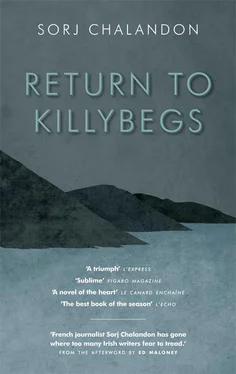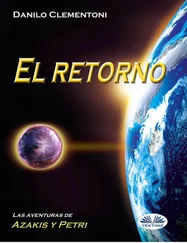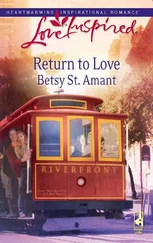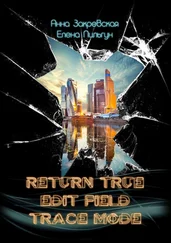— It’s misery’s fault, not life’s, Tom said.
Then we spoke of misery, of the Great Famine, of children standing in the muck with no shoes on. Of the mouldy bread, seeping from the corners of poorly fed mouths. Of my father who had frozen to death. We had a common rage. We had hatred, too. Like our family, Tom Williams had fled his home. A Loyalist bomb had been thrown at a group of children playing in a park. Some of them were killed. Yet it was Terry Williams, his uncle, who had been imprisoned for defending his street, and not the Protestant killers. It was unjust. Everything was unjust. We were alone in the world, our war brushed aside for a war that was not ours. The whole world had turned its back on us. The only people we could count on were ourselves. Tom was on the dole, like all the local men. Like Seánie and I would have been if Uncle Lawrence hadn’t left us his business, his stiff brooms, his trowels, his chimney sweep’s brushes. There would never be work for any of us in this country.
He lit a cigarette, handed me one between his two fingers and thumb, the first in my life. So I took it. To blink through the smoke as adults do. He was watching the street, sitting on a front step. Like him, I had loosened my black tie and opened my collar. He spoke to me about Easter, and he was uneasy. He was only two years older than me but I couldn’t see that youth in him. Tom Williams had the worn face and stare of a widow. I would never again hear so much hurt in another man’s voice.

The British had banned any gatherings on Easter Sunday 1942, but we’d decided to disobey. Nobody was going to prevent us from celebrating the 1916 Rising and honouring the heroes of the Republic.
The IRA had planned three illegal processions in Belfast, protected by uniformed Fianna. When I asked him what we were to do if the police intervened, Tom smiled.
— We’ll keep them busy enough, my leader replied.
My eyes widened. I wanted to know what was planned.
— Do you want our command structure, too?
I blushed and shook my head, inhaling a huge, burning lungful of smoke to shut myself up.
— To everyone his role, Tyrone.
And then he got up. Fingertips to his temple, he saluted me as a soldier. Two óglaigh left their shadowy wall on the other side of the street to guard his passage.
— So long, Fianna! Tom Williams called over his shoulder.
I watched him head farther up Bombay Street, three shadows for a single person. He turned the corner. He was whistling ‘God Save Ireland’. I squeezed the white sliotar . I was afraid for all of us.

On Easter Sunday, Mother had us dress for Mass. I was wearing an old white shirt of Seánie’s, and Niall had on a pair of my old trousers. My Fianna uniform was hidden under Sara’s blanket in the pushchair. The street was deserted and tense. Friendly doors used to be opened to rebel scouts all over the nationalist enclaves. We would get ourselves ready in twos in people’s backyards, hidden in their wardrobes, behind workbenches, in school playgrounds, pub snugs. When we arrived in front of Costello’s grocery, Sheila opened the door. My family gathered around the pushchair as though trying to soothe the baby. They were hiding me. I slipped into Costello’s and the Meehans carried on towards the church.

Danny Finley was at the top of the stairs. He was dressing in silence under the gaze of a mournful Jesus. Sitting on the steps, Sheila watched me slip into my black shirt. I was blushing. I was in love with her. The times were too backward for making a move, and the parents of Belfast knew everything their children got up to. One hand taking another would mean dozens of pointed fingers. It was neither malicious nor derisive, but you could feel that there was always someone making a judgment behind a curtain. The British monitored our movements, the IRA monitored our commitment, the priests monitored our thoughts, the parents monitored our childhood and the windows monitored our romances. There was never anywhere to hide.
— Brits! Brits! shouted a young voice in the street.
Sheila was up in a flash and tearing down the stairs. Danny carried on buttoning his shirt. This calm was his way of panicking.
— Shit, there’s a button missing from the sleeve, my comrade grumbled. He had mended one of the knees of his trousers.
Outside, an armoured car with a loudspeaker was repeating that all gatherings were illegal. That demonstrating during wartime was an act of treason. Back when the hostilities with Germany had begun, military trucks used to roam our neighbourhoods calling on young Catholics to don the English uniform. Few responded to the appeal. In May 1941, more than 200,000 nationalists of fighting age had fled Belfast while thousands of others slept in the fields or hills around the city to avoid the recruiting officers. Our fathers, our mothers and our families took to the streets in their thousands, day after day, to protest against their sons having to die for the king. London abandoned conscription in Northern Ireland on 27 May, and only the Ulster Protestants were left to fight for their flag.
Mother had carefully ironed my uniform. A dark-green shirt, the jacket in the same colour with a closed officer collar, epaulettes, two rows of brass buttons, a white lanyard for attaching the whistle and an orange neckerchief. The Sam Browne belt was my father’s, and I had also inherited his shoulder strap. The enemy truck was moving off. I pinned the Fianna badge over my heart, the burning sun on a blue background. And then we sat down at the top of the stairs to await our orders. I’d put my slouched felt hat with its wide brim on my head; Danny had placed his on his knee. We used to steal ‘Baden-Powells’ by the dozen from scout shops in Dublin and Cork and dye them green. Ireland and Great Britain hunted down our secret army but they couldn’t outlaw our hats.
The Fianna exited on to the street almost simultaneously. Danny and I were standing behind the front door of the Costello house. Sheila was on the lookout behind a curtain she’d pulled back just a fraction. Her father had his hand on the door knob, waiting. There was a metallic whistling. Across the way, two doors opened and four scouts appeared. We left in turn. Danny got us to line up on the pavement. There were ten of us, and another dozen on the opposite side of the street, coming out of the alley. More again were arriving from Kashmir Road.
— Left! Left! Left, right, left!
An officer’s voice. We set off marching towards the Falls Road. I was trembling. It was pathetic. I was trembling and my teeth were chattering. I had dreamed of this epic moment so often. Dreamed of me, Tyrone Meehan, parading in uniform and in step. And here I was, afraid! Or cold. I could no longer tell. My hat was over my eyes and I didn’t dare push it back up. The Cumann na gCailíní girls were arriving from Leeson Street, with their green skirts and their hair tied up. Right arms, left arms, swinging in unison. We advanced along the centre of the avenue like an army of children.
Sheila was following us. She was carrying our civilian clothes in a bag. Every scout was followed at a distance by a mother, a sister or a friend. When our flags were raised, tears came to my eyes and I laughed with joy, feeling the shouts bubble up from my belly. The tricolour of our Republic was huge. It was the first time I had ever seen the green, white and orange floating freely under this sky. The Fianna’s standard was magnificent, fringed in gold, its sun splashed with sky-blue. A boy was carrying the national colours; a girl, the Fianna’s emblem.
Читать дальше













